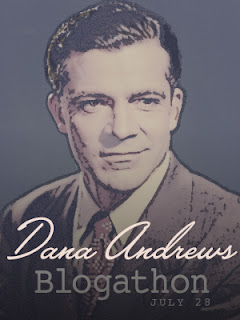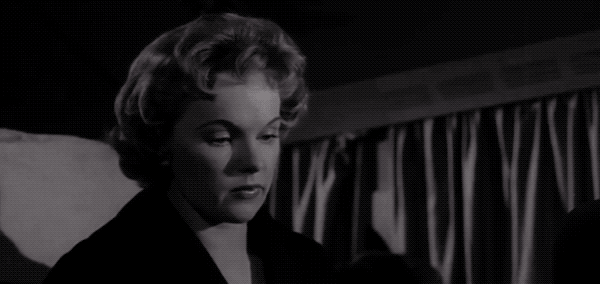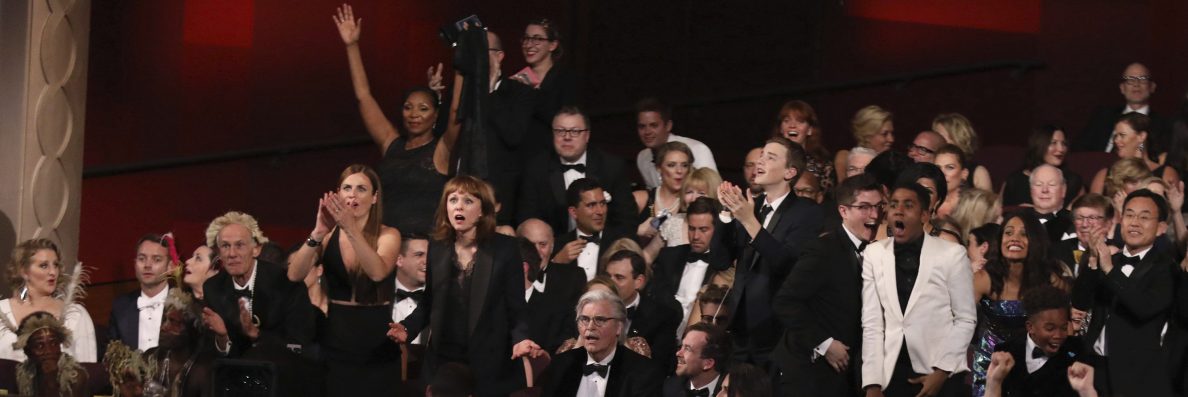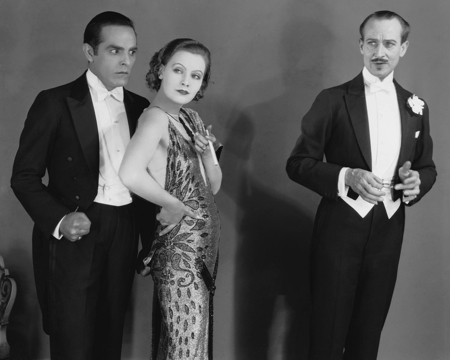Dana Andrews and the films he made have long been favorites of mine so I was delighted when I found out that Steve Reginald (aka @sreggie) of Classic Movie Man was putting together a Dana Andrews Blogathon. The following is my contribution; see the rest of the excellent posts here.
 I’ve chosen Boomerang! (1947), directed by Elia Kazan. The film is based on an actual case of an innocent man being convicted of murder in Connecticut in 1928 (though the city was changed from Stamford to Bridgeport). Kazan wanted to meld the documentary style of a newsreel with Hollywood moviemaking techniques, and he succeeded — this film is the direct ancestor of the “fact-based” docudramas with which we’re so familiar today. It was supervised by the same producer as the March of Time newsreels, Louis de Rochemont, much of it was shot on the run in real locations, and there’s no score. Despite this, Kazan later expressed dissatisfaction with the film, and with his star.
I’ve chosen Boomerang! (1947), directed by Elia Kazan. The film is based on an actual case of an innocent man being convicted of murder in Connecticut in 1928 (though the city was changed from Stamford to Bridgeport). Kazan wanted to meld the documentary style of a newsreel with Hollywood moviemaking techniques, and he succeeded — this film is the direct ancestor of the “fact-based” docudramas with which we’re so familiar today. It was supervised by the same producer as the March of Time newsreels, Louis de Rochemont, much of it was shot on the run in real locations, and there’s no score. Despite this, Kazan later expressed dissatisfaction with the film, and with his star.

The no-nonsense credits — names typewritten on the plain white pages of a script, turned by an unseen hand — reflect the bare-bones staging of the film. The voice-over introduction makes it clear that arresting an the wrong person can happen anywhere: “people are the same everywhere,” it admonishes. Then the fast-paced action kicks off with the murder: The victim, a minister, is shot off-screen. The townspeople react with shock, disbelief and sadness that such a well-known and beloved man could be shot to death just like that; even the local hoodlums throw some money together for a wreath. We see the minister’s life in an economical flashback. He was part of the “reform” government that cleaned up the town, and he knew a lot of peoples’ secrets. The perpetrator could have been anyone. The description of the murderer is appropriately vague: “a man in a dark coat, light hat, medium build.”

Andrews plays State’s Attorney Henry Harvey, who is based on the DA in the real case. He’s first seen around 10 minutes in, when police chief “Robbie” Robinson (Lee J. Cobb) goes to Harvey’s office to give him an update. It’s clear that the case is already a pressure cooker. The local paper, a property of the reform government’s opposition, is taking the opportunity to make the police, and by extension, the incumbents, look incompetent. Editorials in print and on the radio are agitating the citizenry, neighbors are bickering, and even Harvey’s wife Madge (Jane Wyatt) is after him about the case. It’s no surprise that the shadow side of human nature would begin to dominate. When a “tramp” matching the description is found in Ohio, with a gun of the same caliber that killed the minister, and admitting to having left town when the murderer supposedly would have, he’s arrested and brought back to Connecticut. He’s actually a WWII veteran named Waldron (Arthur Kennedy), who is right out of the Army and can’t find a job. The police torture a confession out of him and the case goes to an inquest, which proceeds as you might expect.
 Harvey is at first keen to convict Waldron, practically bounding up the stairs to tell the Chief that ballistics says the bullet and the gun match. But before he takes the next step in the process and indicts Waldron, the attorney decides to chat with him in his cell. This scene is when Andrews really begins to shine. He starts out stern, but as he listens to the prisoner’s story — Waldron has had a lot of bad luck after five years in the military — he shows us the faint glimmers of doubt beginning to creep into Harvey’s mind. Something just isn’t right. It soon becomes even more clear that the “authorities” are concerned with something other than justice — staying in office, getting elected, escaping public ridicule — except Harvey. Because when court is in session, and everyone is expecting an indictment, Harvey declares that Waldron is innocent. The rest of the film is a kind of trial, as Harvey recalls witnesses from the inquest and introduces new evidence to prove his statement true, all the while ending his political career.
Harvey is at first keen to convict Waldron, practically bounding up the stairs to tell the Chief that ballistics says the bullet and the gun match. But before he takes the next step in the process and indicts Waldron, the attorney decides to chat with him in his cell. This scene is when Andrews really begins to shine. He starts out stern, but as he listens to the prisoner’s story — Waldron has had a lot of bad luck after five years in the military — he shows us the faint glimmers of doubt beginning to creep into Harvey’s mind. Something just isn’t right. It soon becomes even more clear that the “authorities” are concerned with something other than justice — staying in office, getting elected, escaping public ridicule — except Harvey. Because when court is in session, and everyone is expecting an indictment, Harvey declares that Waldron is innocent. The rest of the film is a kind of trial, as Harvey recalls witnesses from the inquest and introduces new evidence to prove his statement true, all the while ending his political career.
Andrews is always underrated, but never more than by the director of Boomerang! Kazan is quoted on the TCM site as saying,
There was very little you could do with Dana….He could learn three pages in five minutes. He had a fantastic memory, even though he’d been up late drinking the night before. He’d come to work, dress up, and we’d roll him out. His style was okay in the movie, because he was playing a lawyer, and essentially there wasn’t supposed to be too much going on inside of him. But unfortunately that kind of acting leaves you with the feeling that there was nothing really personal at stake.
Maybe Kazan felt this way because this was an early work (his third feature), and he was still perfecting his style, but I can’t help but think he’s seeing a different film. Maybe he forgot to watch Andrews in the scene in the courtroom where, in order to recreate the crime, Harvey has one of his assistants shoot him with the loaded murder weapon. Andrews certainly isn’t melodramatic (though at one point, as Harvey deals with a gun-toting, blackmailing political hack, we do see a flash of Lt. McPherson from Laura). His performance is subtle and controlled, as in appropriate for a prosecutor, but it’s a very authentic. His Harvey isn’t perfect, just that rare person who will temper his ambition to see justice served. One of the ways Andrews makes him real is that he behaves differently at home than he does at work. (Most people do, maybe even you.)
This film isn’t on DVD, and Fox pulled most of it down from YouTube (hence the mediocre screenshots), so keep an eye for it on TCM. You don’t want to miss one of Dana Andrews’ best performances.
UPDATE: Boomerang! is actually available from ClassicFlix or via Amazon. You could do a lot worse than buying this film. Thanks Stephen!










